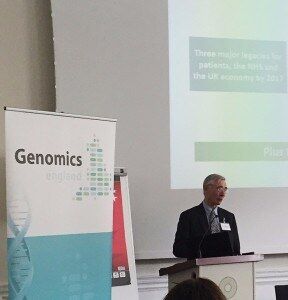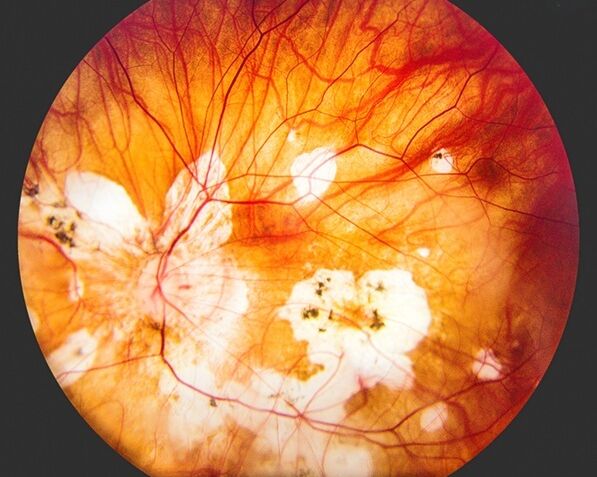Clinicians, Researchers and Industry collaborate with the 100,000 Genomes Project

- First 10 companies come forward to create the GENE Consortium, to accelerate the development of new diagnostics and treatments for patients
- Over 28 teams established from amongst the UK’s leading scientific researchers, to analyse the 100,000 genome dataset and identify new scientific and medical breakthroughs
Genomics England has today (26 March 2015) announced a new collaboration as part of the 100,000 Genomes Project, to accelerate the development of new diagnostics and treatments for patients. Ten pharma and biotech companies have come together to create the Genomics Expert Network for Enterprises (GENE) Consortium, to oversee a year-long Industry Trial.
Genomics England can also announce the specific domains – or areas – that leading clinicians and scientists across the UK will be exploring within Genomics England’s Clinical Interpretation Partnership (GeCIP), with a view to identifying new scientific findings and medical discoveries from the 100,000 genome dataset as it emerges.

The unique partnership between academia, the NHS Genomic Medicine Centres and industry will transform treatment for patients with cancer and rare diseases, providing faster access to the right treatment and personalised care to tackle complex diseases, establishing the UK as a world leader in this field.
Through the GENE Consortium, companies will work on a year-long Industry Trial involving a selection of whole genome sequences across cancer and rare diseases, discovering how best to collaborate with clinicians and researchers. Genomics England will also collaborate with companies that specialise in data analysis, so that the project can benefit from cutting edge advances in handling Big Data. The Trial aims to identify the most effective and secure way of bringing industry expertise into the 100,000 Genomes Project in order to realise the potential benefits for patients. The GENE Consortium is being launched at a workshop in London (today at 09:30).
Commenting on the partnership between these ten companies, researchers and Genomics England, Sir John Chisholm, Executive Chairman of Genomics England said “We are determined that NHS patients will be amongst the first to benefit from the discoveries uncovered by the project. That is why we are delighted to announce this partnership: working with industry from the start and making the most of their unique expertise in developing new diagnostics and treatments. This year we will explore how companies, clinicians and researchers can work together on the 100,000 Genomes Project – giving us a platform to expand and build upon.”
As the delivery of the 100,000 Genomes Project gathers pace, with nearly 3,000 genomes now sequenced, Genomics England is today announcing more detail on how clinicians and scientists will partner with the project. Following a call to the research community in November last year, more than 2,000 researchers, clinicians, analysts and trainees were involved in 88 applications to become part of GeCIP. Today, Genomics England announces that over 28 teams or ‘domains’ will be established for clinical and research experts to work in as part of its Clinical Interpretation Partnership (GeCIP). Teams will focus not only on a vast range of disease areas, but also analytical and social sciences.
Commenting on Genomics England’s Clinical Interpretation Partnership, Professor Mark Caulfield, Chief Scientist for Genomics England said:
“This partnership brings together over 4000 UK clinicians and scientists as well as over 500 international collaborators at the forefront of Genomic Medicine. They have all committed to work on the 100,000 Genomes Project to drive up the quality of clinical interpretation to ensure that we feedback more new diagnoses to NHS patients.
The domains we are announcing today cover the entire range of diseases within the 100,000 Genomes Project. For example in rare disease there are domains ranging from cardiovascular, neurological to paediatric. In cancer, there are disease specific domains such as breast and colon, and also analyses across multiple cancers looking for common features and pathways. Excitingly many proposals offer added dimensions to the programme such as ethics, social science, state-of the art analytical methods, and advanced machine learning. Reference library domains also offer a range of key reference databases essential to understanding the impact of the 100,000 Genomes Project on human health.
We hope that this unique collaboration will lead to earlier and more precise diagnoses for patients and, working with companies, will pave the way for new, more targeted therapies and treatments.”
The following ten companies are the first to sign up to the GENE Consortium:
- AbbVie
- Alexion Pharmaceuticals
- AstraZeneca
- Biogen
- Dimension Therapeutics
- GSK
- Helomics
- Roche
- Takeda
- UCB*
*Subject to contract negotiation and signature.
Please see our Partnership section of our website for further details.
The Genomics England Clinical Interpretation Partnership will work in over 28 domains, amongst the many domains approved are:
- Rare Disease e.g. cardiovascular, neurological, paediatrics amongst others
- Cancers e.g. breast, colorectal and other cancers
- Pan cancer analysis across many cancers
- Functional effects on gene expression, proteins and life-long DNA changes
- Electronic Health Records Research
- Ethics, law and social science
- Health Economics
- Validation and Feedback


